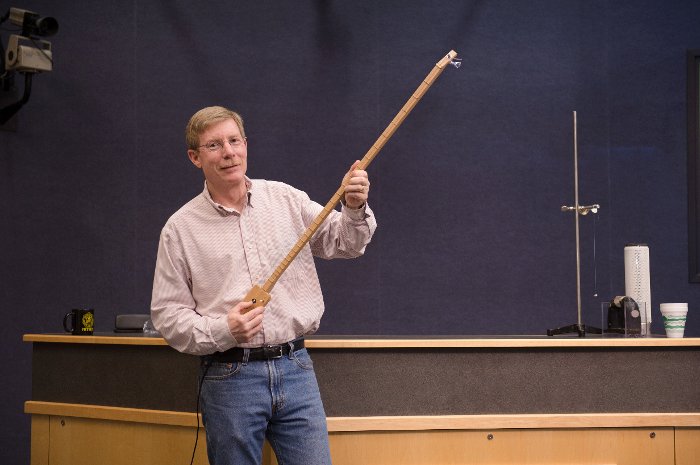Bryan Suits, a professor in the Department of Physics from 1985 to 2023, passed away this month.
Bryan’s primary research focus was nuclear magnetic resonance (NMR). His most cited work concerned remote sensing by nuclear quadrupole resonance, applied to problems such as explosives detection. Notably, the NMR spectrometers and processing electronics in Bryan’s lab contained almost no commercial instruments. Everything was Bryan Suits’ brand, designed and built by him and his students. He couldn’t find any instruments matching the impedance of his coils, and phase-sensitive detector and boxcars were not fast enough for him, so he simply built everything himself.
Bryan was also a regular contributor to the American Journal of Physics and The Physics Teacher, writing on wide-ranging topics from frequency and pitch, to the propagation of typos, to long pendulums in gravitational gradients. The latter was inspired by Bryan’s historical research into early 20th century pendulum experiments conducted in the Tamarack Mine by Michigan Tech Physics faculty. In 2005, these were recognized by Guinness World Records as the World’s Longest Pendulum thanks to Bryan’s efforts (the piano wire and iron weights were hung 4,250 feet down Shaft No. 5, and the pendulum period was a remarkable 70 seconds).
Bryan answered the call of duty to serve as department chair during Physics’ crucial and extraordinarily difficult transition to a significant focus on research. Afterward, Bryan dedicated himself to teaching. His experimental skills became invaluable assets for our students. He developed a state-of-the-art electronics lab that accompanied his lectures. The lab wasn’t just based on computer simulations; instead, students built electronic gadgets from scratch using a soldering iron and basic components.
Bryan received the Michigan Tech teaching award in 2007. He fully deserved it just for that electronics class, but in addition, he developed a highly successful and popular Physics of Music course containing fascinating demonstrations, another example of Bryan’s exceptional experimental abilities. Finally, the many live demonstrations experienced by hundreds of Michigan Tech students in introductory physics courses Mechanics and Electricity and Magnetism were developed and refined by Bryan. His legacy of teaching lives on through his demos and through two textbooks he wrote for the courses he developed: “Electronics for Scientists” (Springer, 2020) and “Physics Behind Music” (Cambridge, 2023).
Bryan also had a rich personal life. He raised his family in Houghton. He was a stalwart member of the Physics softball team. He was a musician extraordinaire, performing for many years as the principal flutist of the Keweenaw Symphony Orchestra. His artistry on the flute created many memorable performances, including major solos by Debussy, Saint-Saens and Shostakovich. One of his prized accomplishments was rediscovering a lost symphony by astronomer-composer William Herschel (who discovered Uranus). After Bryan edited and rescored it, the KSO premiered the symphony in October 2022. Ten years ago or so, Bryan started to run. He was determined to run and finish the Boston Marathon, and his dream came true when in 2017 he ran in and finished the race.
Bryan’s dry wit, warmth and musicality made a lasting impression on all who knew him.

